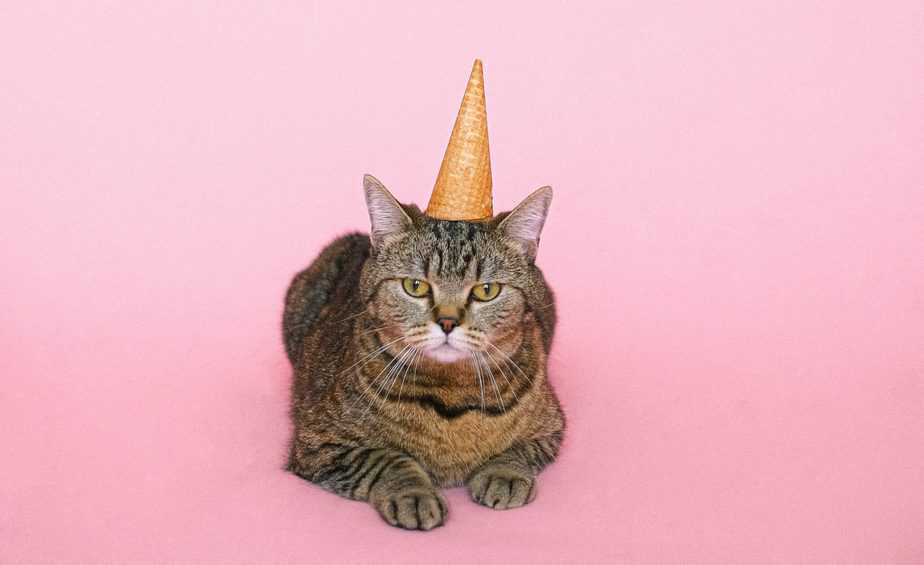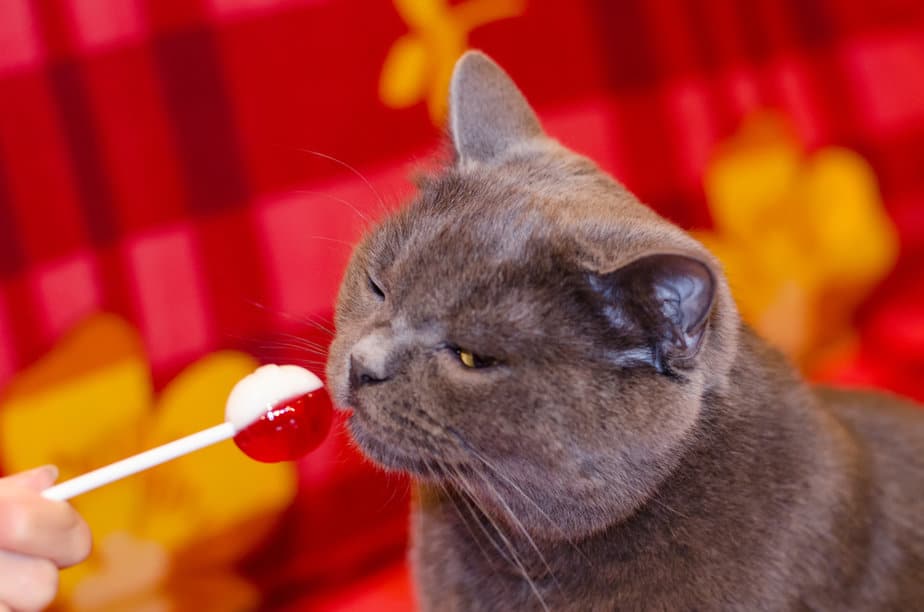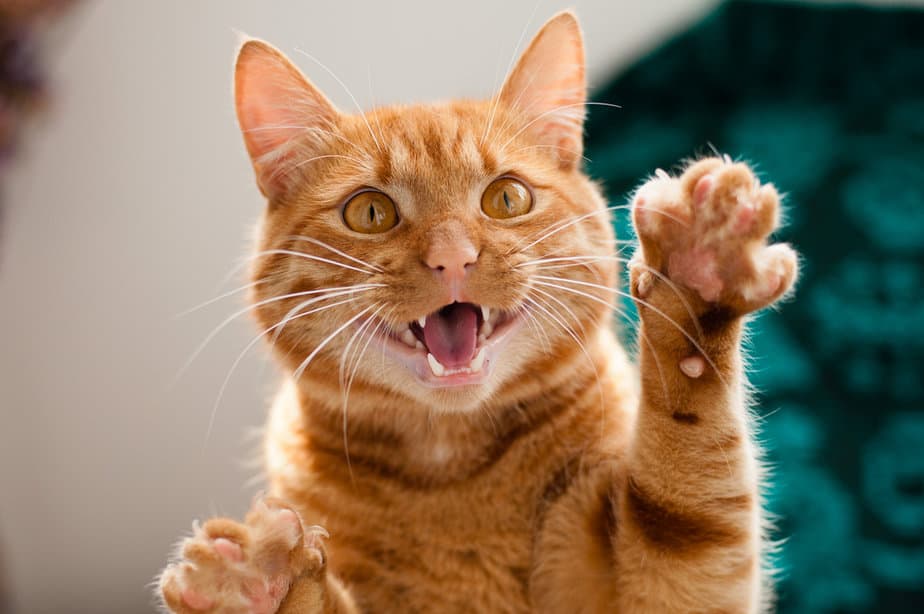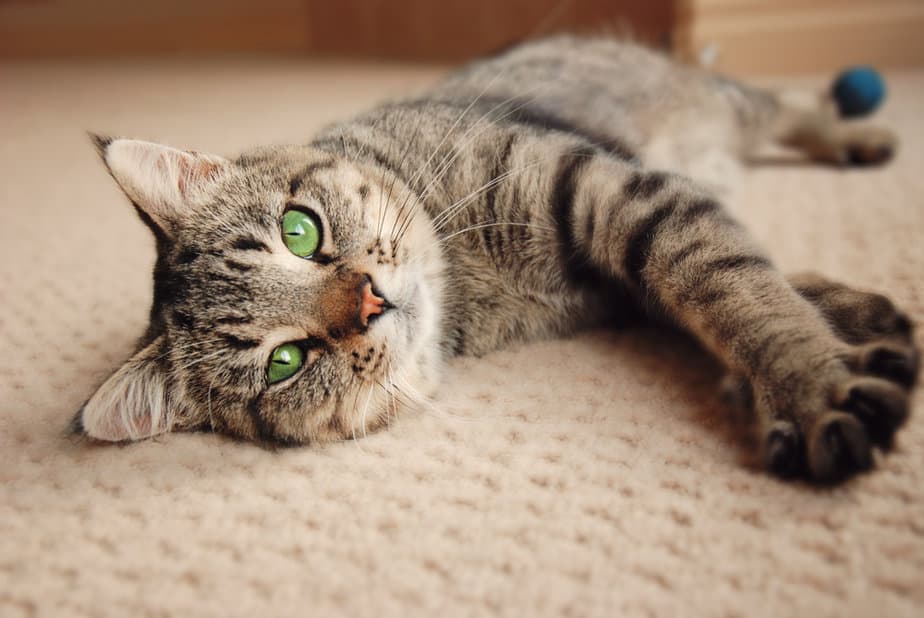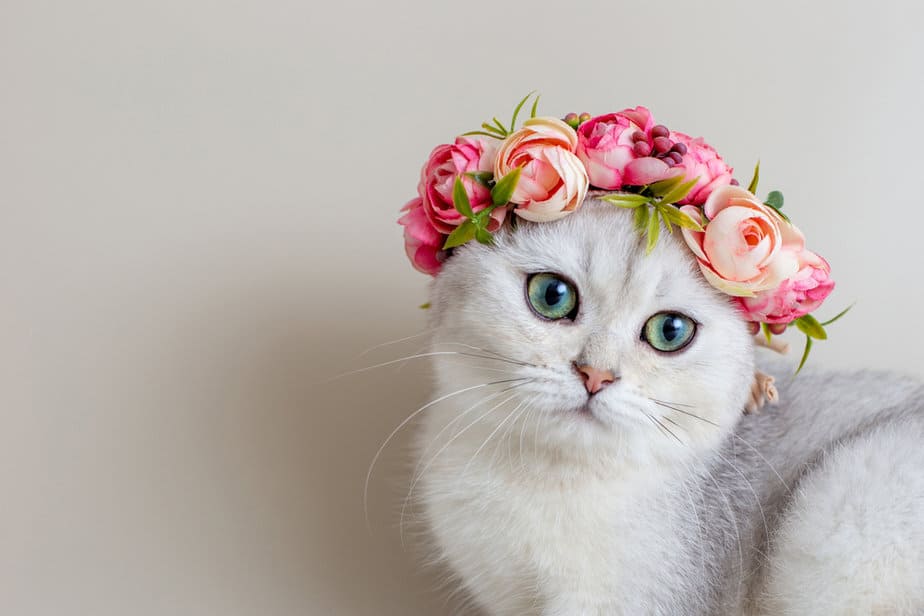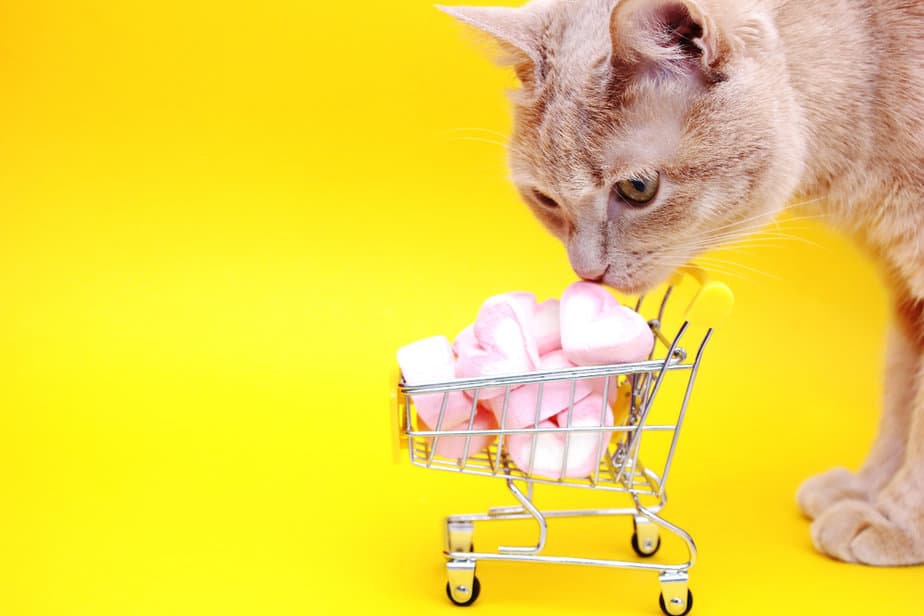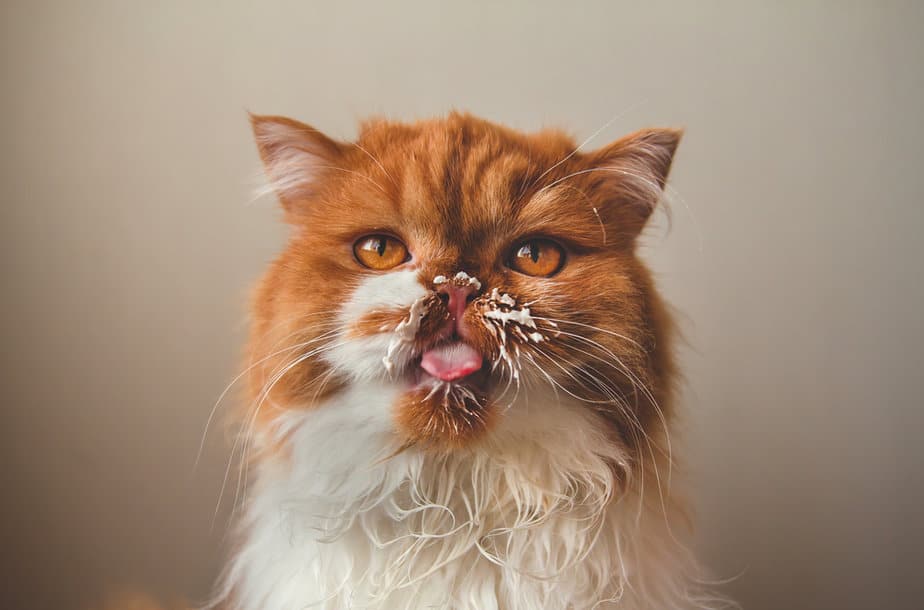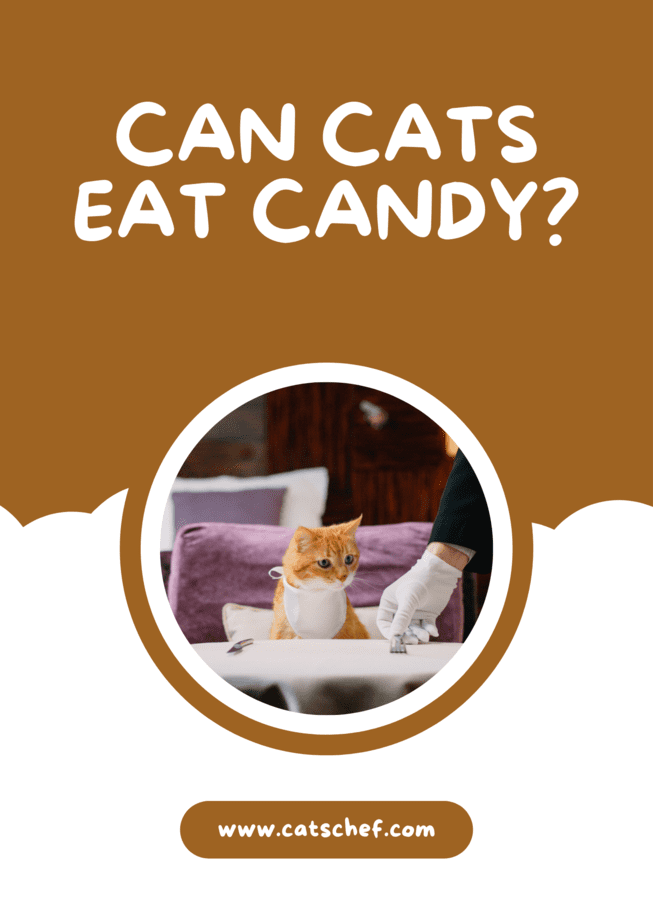📖 Table of Content:
Oh, the age-old question. There isn’t a cat owner in this world that hasn’t found themselves in the middle of their apartment looking at their cat with judgment in their eyes, trying to google “Can cats eat candy?”
And, here we are! Whether you have a sweet tooth, leave candy wrappers in the oddest of places in your apartment, or live by the mantra that “sharing is caring,” chances are you found yourself in a situation where you considered feeding your feline friend rogue confectionary.
You have no idea whether she even likes sweet things and sugary treats, but when she gives you that “Aren’t you going to share that deliciousness with me, mommy” look, you can’t help but give her whatever her little heart desires.
While that’s incredibly sweet of you (pun intended), it might not be the type of balanced diet your vet was talking about when he was teaching you how to take care of your four-legged friend. According to our friends over at the ASPCA, you should never feed candy to your cat.
But, what type of candy are they talking about? Why do they consider candy so dangerous to your furry friend? What reasons do they have for their decision? Scroll down and find the answers you’ve been looking for when you googled whether or not cats can eat candy.
Can cats eat candy?
“Cats are obligate carnivores!” You’ve probably read (or heard) that a million times before, but have you ever wondered what that actually means?
Your precious purrincess requires predominantly meat, animal protein, and animal-sourced nutrients to survive and thrive. Let’s be honest, she doesn’t do much hunting these days like her wild ancestors, which means you’re the one who’s responsible for providing her with necessary sustenance.
Regular cat food typically contains the right amount of protein, vitamins, and minerals that keep your cat’s health in check. Most cats are fans of human food (and pretty much anything they notice their human eat). You can always give her an occasional bite of meat to keep her satisfied.
But, what about candy? Can cats eat candy without any repercussions? There are many different types of candy available on the market today. But, there’s only one right answer to the question: NO. Cats can’t eat candy without experiencing serious adverse reactions.
Sugar, chocolate, xylitol… You can find these harmful ingredients in most commercially available types of candy. And that’s not even the worst thing about feeding candy to your cat (or having your cat steal some from your secret stash).
Cats can’t digest sweet things. As we’ve mentioned at the beginning, cats are carnivorous. Their digestive systems aren’t designed with carbohydrates in mind because that’s not what their natural diet is supposed to look like.
It’s safe to say that your fur-monster should steer clear of your Halloween candy. And yes, that also includes cotton candy, candy corn, and corn syrup! And yes, that also includes the type of candy you eat when it’s not Halloween!
Why cats can’t eat candy?
Technically speaking, cats can eat candy because most types of sweet treats aren’t toxic to cats. Let’s say your curious creature gives your vanilla ice cream a couple of licks or she munches on a bonbon that fell on the floor. Don’t panic, she will survive!
When we say that you should never feed candy to your cat, we aren’t talking about those situations when your mischievous monster steals a bite of something she shouldn’t be eating.
We’re talking about consciously feeding her different types of candy as a regular part of her diet. We’re talking about leaving chocolate, chewing gum, and mint within the reach of her pesky paws. Trust me, that’s a no-no for so many reasons. Just take a look at these!
1. Sugar
According to our friends over at the ASPCA, sugar isn’t listed as toxic to your furry friend. But, that certainly doesn’t mean that it doesn’t fall under the category of things that are harmful or in any way unfavorable to your furry friend.
Trust me, there are many reasons cats can’t and shouldn’t eat sugar. They can’t digest it properly because their digestive systems don’t possess the enzymes necessary to break down carbohydrates and turn them into energy. They’re nothing like their humans!
As a result, consuming too much sugar can lead cats to experience numerous digestive issues and health problems. From stomach upset, diarrhea, and vomiting, to weight gain, obesity, and diabetes – too much sugar can only lead to poor quality of life.
Having a chonky cat sounds like a dream come true… But, having a healthy one sounds so much better because you know healthy equals happy. Let’s keep those sweet treats for Ms. McFluff to a minimum!
2. Chocolate
The queen of all sweets doesn’t seem to rule the feline kingdom! Unfortunately for every feline in the world, chocolate does fall under the category of incredibly toxic foods to felines. Even a tiny bite might send your cat running to her litterbox.
So, what’s the fuss about the relationship between chocolate and cats? Chocolate contains a couple of essential ingredients that can lead to an array of health problems including liver damage, kidney disease, and kidney failure.
Yes, we’re talking about theobromine and caffeine. Excessive amounts of these two essential ingredients in chocolate can even lead to a condition known as chocolate toxicity or chocolate poisoning. Diarrhea, vomiting, weakness, lethargy, seizures…
Trust me, you don’t want your kitto to experience any of those symptoms. But, if she does manage to get her paws on the chocolate praline you were saving for later, make sure to contact your vet immediately. It’s better to be safe than sorry!
3. Raisins and other harmful ingredients
Here’s something you probably didn’t know. Raisins are even more dangerous than chocolate when it comes to feeding them to your furry friend. There are numerous types of candy that contain raisins and other harmful ingredients and you should certainly keep an eye out for them.
Candy raisins, raisins cookies, and chocolate-covered raisins are only a couple of the sweet treats you should keep out of your cat’s reach. While she might think they look absolutely paw-licking, her digestive system wouldn’t agree.
Consuming too many raisins over a longer period of time could cause some serious damage to your cat’s health. Not only are raisins incredibly damaging to your cat’s digestive system, but they also might lead to kidney disease and kidney failure.
Apart from raisins, you might also want to keep tabs on the different types of nuts that might be found in the majority of commercially available candy. While your furry friend isn’t likely to experience a nut allergy, she’s likely to stumble upon a type that’s harmful.
For instance, macadamia nuts are incredibly toxic to cats. Walnuts, almonds, and pecans aren’t, but they are rich in oils that might be tough on your cat’s tummy. Either way, it’s best to avoid anything that might cause harm to your precious pet.
4. Xylitol and other artificial sweeteners
Let’s head on to an ingredient that most of us can’t even pronounce properly! While it might not be important to learn the proper term for this artificial sweetener, it’s certainly important to remember that xylitol shouldn’t find its way into your cat’s tummy.
Unfortunately, xylitol and most other artificial sweeteners might cause health problems to your four-legged friend if consumed over a longer period of time. One piece of candy containing this type of ingredient shouldn’t cause any harm, but…
It’s better to be safe than sorry. Believe it or not, xylitol could cause seriously low blood sugar levels which, in turn, can lead to liver damage and liver failure. While you might think sugar-free options might be the way to go, they’re typically rich in artificial sweeteners.
This is what we mean when we say “Just because your cat can eat something doesn’t mean she should.” Xylitol? More like xyli-to-none!
5. Choking hazard
Last but not least, most types of candy pose a choking hazard to your four-legged friend. They come wrapped in pesky plastic that can find its way into your cat’s digestive tract. Or they even come in weird shapes that can get stuck in her throat or esophagus.
Think about it… Small, oddly shaped candy could trick your cat into swallowing without chewing or breaking it apart beforehand. Gummy, chewy, or sticky candy could get stuck in your cat’s mouth and cause discomfort. Hard candy could break apart and cut your cat’s throat (or even intestines).
These risks sound just as dangerous as all those unfavorable ingredients. You can’t help but wonder whether it’s worth trying to find a type of candy that isn’t going to send your furry friend to the emergency vet clinic. Give her a piece of meat and she won’t even notice your Nerds!
Can cats eat cotton candy?
Your precious purrincess goes crazy when she sees cotton candy? Who could blame her!? This incredibly sweet treat looks like something out of a fairy tale and it’s only natural for a real-life member of the royalty to show interest in giving it a little lick. But…
Cats can’t eat cotton candy! Unfortunately, cotton candy is rich in sugar which doesn’t bring anything to the table when it comes to your cat’s nutritional needs. Your cat’s digestive system wasn’t designed to break down carbs (and guess what category sugar falls under!?).
Don’t panic, an occasional lick or two won’t cause any serious damage to your cat’s health. Make sure you don’t let your cat munch on the entire thing while you aren’t looking, and you should be fine. But, on the off chance that she does take more than one lick…
Look for signs of discomfort, stomach upset, vomiting, and diarrhea. Contact your vet if you have any reason to believe your cat might be in danger of a sugar overload. Other than that, keep a close eye on your cat when she’s roaming around the kitchen looking for trouble!
What about candy canes?
Cover your four-legged friend’s eyes because she might be incredibly disappointed to find out that… Cats can’t eat candy canes! Everything we’ve said about cotton candy applies to candy canes, as well. They’re too sugary, too hard (opposite of cotton candy), and they lack nutritional value.
When it comes to your cat’s diet, you should follow the ten to ninety rule which says that cat treats should only comprise around 10% of your cat’s food intake. Do you really want to spend that 10% on candy canes that can only cause harm to your precious pet!?
Apart from being sugary and sweet, candy canes can easily become a choking hazard because they’re so hard. When your cat tries to chew on them, she might break them apart. Small candy cane pieces might end up getting stuck in her throat or even cutting her insides. Immediately no!
Can cats eat marshmallows?
Can you guess what the answer to this one might be? You probably guessed it right, cats can’t eat marshmallows. While it might seem like we’re telling you cats can’t eat pretty much anything other than meat, we’re just looking out for your four-legged friend.
So, what happens when your cat ingests a marshmallow? One marshmallow isn’t going to cause much damage to your cat’s health. There’s no reason to panic and rush to the emergency animal center because marshmallows aren’t necessarily toxic to cats. But…
Letting your cat eat them over a long period of time might cause some digestive problems, stomach upset, diarrhea, and vomiting. Your cat’s digestive system doesn’t contain the enzymes that are necessary to break down the sugar in marshmallows, so it’s best to avoid them.
And what about ice cream?
Believe it or not, your lap monster might be lactose intolerant! While most cat parents think their precious pets require lots of milk in their regular diet, they couldn’t be further from wrong.
You see, while Ms. McFluff was a little kitten, her digestive system was equipped with an enzyme that was responsible for breaking down the lactose in milk. As she grew older, this enzyme slowly disappeared from her digestive system as it was no longer necessary.
That means that when she consumes milk as an adult cat, she’s at risk of experiencing digestive issues such as discomfort, nausea, vomiting, and diarrhea. Your cat might not experience the same symptoms as other cats, but it’s better to be safe than sorry.
Additionally, ice cream contains another incredibly difficult-to-pronounce ingredient that might cause serious health issues to your cat. Propylene glycol might cause symptoms such as fever, weakness, and loss of appetite which can, in turn, cause a condition known as hemolytic anemia.
This explanation might contain too many big words, but the main point is pretty clear: cats can’t eat ice cream! It’s better to play it safe when it comes to your precious pet’s health.
Cats can’t eat candy, but don’t forget…
Sugar and spice and everything nice doesn’t mean a thing to your four-legged friend. Believe it or not, cats can’t taste sweet things! The only reason your cat seems super interested when you whip out a packet of Nerds is that she’s curious to see what you’re so excited about!
Trust me, she couldn’t care less about the cotton candies and candy canes of the world. She only has around four hundred and seventy taste buds, and all of them are reserved for the delicious chicken, turkey, and beef. She doesn’t crave that sugar high the same way you and I do!
While it’s true that cats can’t eat candy, it’s also true that they most likely don’t even want to. There’s nothing to be disappointed about. You can still make your precious purrincess happy with an array of tasty treats that are designed to make her happy and healthy!
